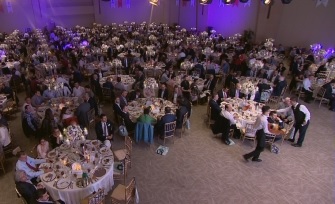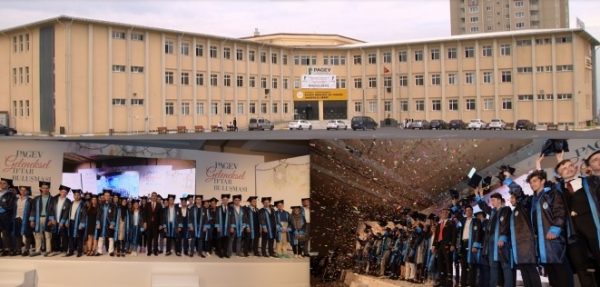In a circular to media, PAGEV (The Turkish Industry Foundation) announced the Federation’s special dinner cermony during the Ramadan (These dinners are called Iftar) at the presence of many key persons from the industry and also the students of the Plastics high school. The report is self explaining:
This School’s Alumni Already Have Jobs Ready
Turkish plastics industry, one of the youngest and most rapidly developing industries of Turkey, holds Europe’s second and world’s seventh largest production( conversion) capacity. Providing employment to over 250 thousand, plastics industry requires around 25 thousand more employees every year. Carrying out school projects to eliminate this problem, PAGEV brought plastics producers of the future, the first graduates of the new PAGEV Vocational and Technical High School, and industrialists together at the traditional iftar dinner. Alumni charged with the commencement vibe got the chance of employment.
The Turkish Plastics Industry Foundation (PAGEV) hosted industry representatives at the traditional iftar dinner at Istanbul Congress Center. Organized by PAGEV, the iftar dinner was attended by 1000 distinguished guests, including key actors from plastics industry, NGOs, various other industry-related institutions and organizations and the first alumni of the new PAGEV Vocational and Technical High School.
“Employment” for every graduate…
Commencement vibe of the first alumni of Küçükçekmece PAGEV Vocational and Technical High School was all over the night. Receiving their diplomas from industrial leaders, the alumni took their first step to the industry.
The new PAGEV Vocational and Technical High School was founded as part of PAGEV’s education mission with precious supports of representatives of the Turkish plastics industry and affiliated to the Ministry of Education, accepting their first students in 2013-2014 educational year. Bearing a 1000 student capacity, the School raises trained personnel to the plastics industry to close the need.PAGEV has two vocational schools with 1500 students preparing fort he Plastics Industries future.
Yavuz Eroğlu: We serve the industry…
Eroğlu underscored their contributions to give pace to the industry, and expressed their determination to be the catalyst of the plastics companies on national and international basis. Elected as the President for a second time unanimously by the members of PAGEV, Yavuz Eroğlu said they drew a more effective road map, and added: “Today, PAGEV thus Turkish Plastics Industry has become stronger than ever. We are determined to take the Turkish plastics industry further, developing our solution-oriented approaches.”
Plastics industry is on the rise…
Explaining how domestic consumption shouldered the plastics industry in the first quarter of 2017, Yavuz Eroğlu said, “Plastics production in January-March period increased by 14 percent reaching 2.3 million tons with an 11 percent increase on the basis of value reaching $8.8 billion. 2.1 million tons of this production were consumed by exporting industries including automotive, packaging, construction and electronics, and other consumers. Amount of exports in plastics industry in the first quarter became 389 thousand tons reaching $1.011 billion on the basis of value. As representatives of Turkish plastics industry, we are happy to contribute more, increase added-value and generate more employment day-by-day,” concluding his words.
TURKISH PLASTICS INDUSTRY – FACTS AND FIGURES
* In 2016, 8.9 million tons and 33.8 billion dollars of plastic products have been produced. Total plastic end products production has increase by 3.5 % on the quantity basis and by 3 % value basis compared to 2015.
* The increase in plastic domestic consumption and indirect exports have been the engine of production increase in plastic products in 2016. Production has increased by 3.5 % on amount and 2.8 % on value basis compare to 2015. Imports has increased by 0.8 % on amount and 1.9 % on value basis while exports decreased by 5.8 % on value basis.
* In 2016, domestic consumption of 7.9 million tons and 32.6 billion dollars was realized and has increased by 4 % on value and amount basis compare to 2015.
* In 2016, 7.9 million tons of plastics domestic consumption was exported indirectly by the exporting sectors such as automotive, packaging, construction and electronics as well as semi – finished products and finished products. The remaining 3.95 million tons was consumed directly by the consumer in the domestic market.
* It is observed that plastic packaging materials with about 3.55 million tons were followed by plastic construction materials by 1.95 million tons in total plastic products production, which was 8.9 million tons in 2016.
* In 2016, 1 million 551 thousand tons and 34 billion 109 million dollars of plastics end products were exported. It has declined by 2 % on amount basis and 5 % by value basis compare to 2015. Iraq, Germany, UK, France and Israel formed the most exported plastic markets as it was in 2015 in 2016.
* The investment of machinery and equipment in the plastics sector was realized as 880 million dollars in 2016 and it has increased by 5 % compared to 2015.
For more information, please visit www.pagev.org













